Consolidated Liberator, BZ910, near Inishtrahull Island, Donegal, July 1944
The events of Thursday, 13th July 1944, were observed by the light house keeper at Inishtrahull Island, about six miles north of Malin Head, the most Northerly Point in Ireland. He reported having witnessed the crash of an aircraft in the sea to the east of the island. Information was relayed to land and among the organisations receiving the notice, the Royal National Lifeboat Institution (RNLI) station at Malin Head sent out a four man rescue boat at 10:30 at night. Upon reaching the area they found Royal Navy vessels already on station. The naval ships had already picked up survivors from the sea.
The Royal Air Force's 120 Squadron was based at Ballykelly airfield at this time and it was a Liberator patrol bomber of their unit that was the subject of the rescue attempt. Around 15 minutes after its 8 o'clock evening take off, aircraft 'F', serial number BZ910, crashed into the sea. Of the nine crewmen on board, only four would survive.
The crash was researched from the Royal Air Force archives in
particular by the nephew of the pilot, Harold Cruttenden. This
formed part of the study into the family surname on the Guild of
One name studies, CRUTTENDEN CONNECTIONS. Ian Cruttenden
was kind enough to share what he had obtained from the UK and
Canadian archives and to this was added additional details of
the crew members from further research.
The RAF Form 765, "Report on Flying Accident" includes short
statements attributed to the survivors.
The Captain, F/Lt. Bates, who was
acting as Navigator states that shortly before reaching
Inishtrahull the Engineer came back and told him something
was wrong with the aircraft. The D.C's and the Leigh Light
were jettisoned. The aircraft by that time was swinging from
side to side very badly and losing height. A few seconds
later the aircraft plunged into the sea. The aircraft was
originally at 400 ft.
The Flight Engineer states that they were flying at 2100
revs. and started to lost height. On the pilot's orders
revs. were increased to 2250 and boost to 35" but it didn't
seem to do any good. The pilot said "we are going to crash,
drop the D.C. 's". When he got forward the aircraft
was diving towards the sea. It appeared to him to be a
stall. The aircraft was swinging from side to side as it was
losing height.
Quite a strong fire occurred in the tail of the aircraft,
probably due to pyrotechnics, but little from the remainder
of the aircraft.
It concludes with remarks by the Commander of RAF Station
Ballykelly, Group Captain H R A Edwards.
13 REMARKS BY STATION COMMANDER
The aircraft would appear to have stalled when flying at
400ft., and to have continued to lose height until it struck
the sea.
It would appear that due to the proximity of the sea the
pilot held the nose up and aggravated the position.
Four members of the crew were rescued
by a frigate after being in the dinghy about 3 hours.”
The RAF Form 1180, Accident Report Card,
recorded the following:
ILOC At 400’ A/C stalled, lost ht
[height] & crashed in sea. Fire on impact
AOC A/C stalled
P SFM PCM/C Cause of accident was
E.J. [error of judgement] on part of pilot (1) in that he
failed to maintain sufficient margin of airspeed above
stalling speed for fully laden a/c at start of sortie. None
of the crew were wearing Mae Wests
WWM Low cloud base forced a/c to fly at
low height
ADDITIONAL EVIDENCE C of I, AOC & AOC
in C concern
(AOC - suitable action concerning wearing Mae
Wests taken up with Sqdn Commander, it being noted that
Navigator was captain of a/c)
BLAME AND DISCIP. ACTION E.J.
The four survivors of the crew found themselves adrift.
From the log book of Sgt C W Stevenson, their rescue was
effected by the Royal Navy Frigate HMS Gardiner after 3 1/2
hours in a dingy. They were passed then to an ASR launch
which landed them in the city and allowed them to be brought to
the US Navy hospital built around Creevagh House to the west of
Londonderry. Sgt Stevenson's log book is shown below.
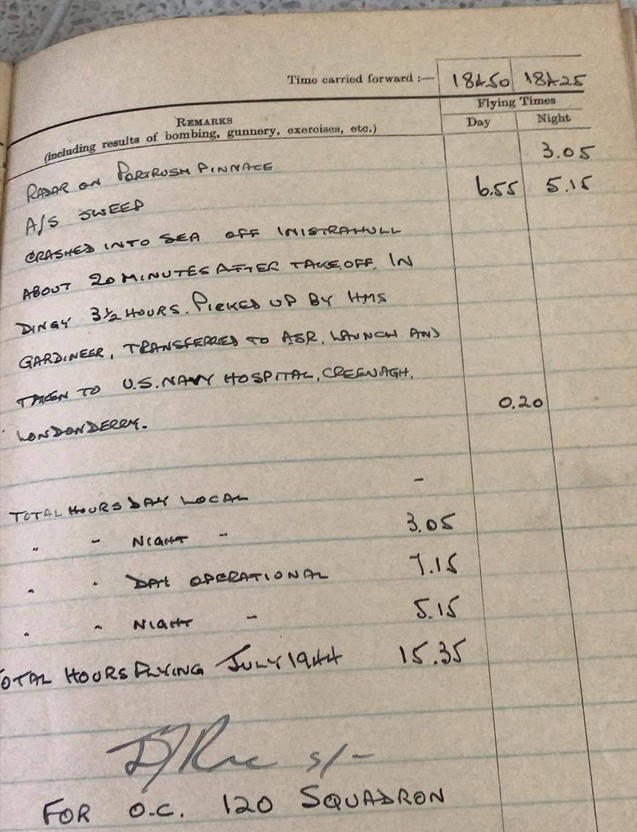
Where available, a photo of each crew member is presented below and further details of them are provided in the text. The names of P/O's Cruttenden and Towsley and F/Sgt's Peaty and Pye are memorialized on the Runnymede Memorial in Surrey.
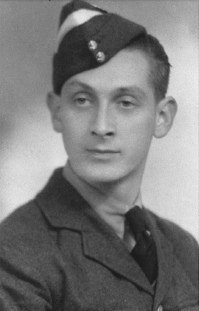 W/O Harold Sidney
Cruttenden 1336640 (Pilot)
W/O Harold Sidney
Cruttenden 1336640 (Pilot)
Missing in Action as a result of the crash of BZ910.
Harolds story had been told by his grateful nephew, that
website is however unavailable at this time.
He was born in December 1922 in Bromley, herts to Mary Ann and
Sidney Cruttenden.
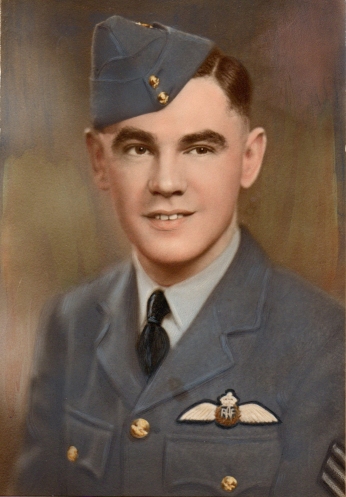
F/Sgt Cyril Arthur Peatey 1585409 (Co-Pilot). Missing in
Action as a result of the crash of BZ910. Aged just 21,
Cyril was the son of Arthur John and Clara Daisy Peatey, from
Buckinghamshire. His 1946 probate record gives an address of 6
Chairborough Road, High Wycombe, Buckinghamshire.
The Bucks Free Press of July 28th, 1944 published his photo and
an obituary.
Killed During Air Operations
Flight-sergeant Cyril A. Peatey, elder son of Mr. and
Mrs. A. J. Peatey, of 6 Chairborough-road, High Wycombe, has
been killed during air operations. He would have
attained his 22nd birthday on August 1.
Flight-sergeant Peatey was educated at the Royal
Grammar School. High Wycombe. and was a former member of No.
708 (Royal Grammar School) Squadron Air Training Corps.
Previous to joining the R.A.F. for which he volunteered
in July, 1941, he was employed by Messrs. Richards, estate
agents, of Marlow.
Flight-sergeant Peatey received his training as a pilot
in Canada, and at the time of his death he was a pilot in
Coastal Command.
His family remembered him in the newspaper each year after the
war with a memorial notice.
His brother, Dennis, in 2011, was able to provide the photos
presented on this page. Dennis Peatey passed away in 2012.
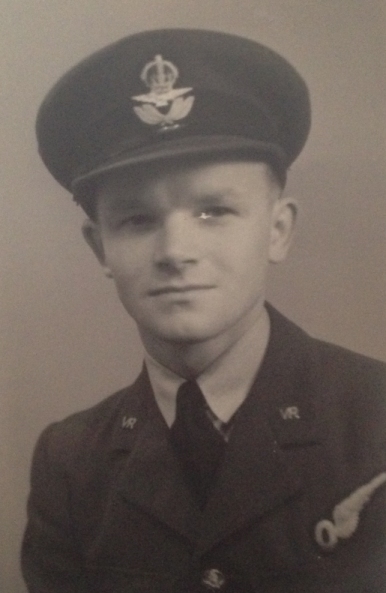
F/Lt Henry Joseph Bates 122065 (Navigator [Captain]). A
navigator by trade and the highest ranking member of the crew,
he was the Captain of the flight. H J Bates survived the crash
and was posted to 1674 Heavy Conversion Unit. He had been flying
with 120 Squadron since at least August 1943. The records of 201
Squadron show him being posted to 120 Squadron in April 1943. He
was posted to 201 Squadron in December 1942 from RAF Station
Pembroke Dock.
Review of the wartime Air Force Lists from 1942-1945 shows that
there was only ever one airman and officer with that name and
further, the UK National Archives Index to RAF Airmen (AIR78)
lists only one airman enlisted with this name. By chance,
Ancestry.com has record of a Henry Joseph Bates aged 26 as
arriving in New York in 1947 as a representative of UNRRA,
United Nations Relief and Rehabilitation Administration. In the
notes to his immigration forms it states that he had previously
visited the United States during 1941 while training with the
RAF in Canada. H J Bates 122065 was commissioned as an officer
in the Spring of 1942. A query with the DHH in Canada
finally revealed that Henry Bates had in fact been assigned to
RAF Ferry Command for a a short period, probably after
completion of training in the BCATP. He arrived in
Montreal in March of 1942 and was assigned to fly Lockheed
Hudson Mk III FH343 from Montreal to the UK between 21 April
1942 and 25 Apr 1942.
Henry was born in 1922 in London to Agnes and XXX Bates.
On the 1939 register he is to be found living with his widowed
mother in London but in 1943 in Scarborough he married, and this
being his address in 1947 when passing through New York provided
the clues needed to contact his family who very kindly provided
the photo shown above.
Henry Bates died in Worcester in 1998.
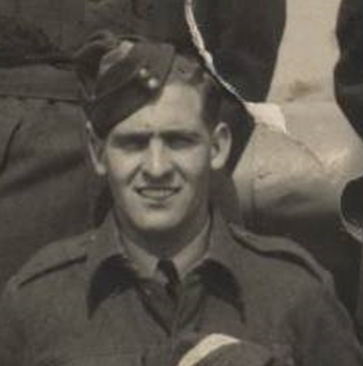 F/Sgt Theophilus Pye
1324862 (Navigator). Missing in Action as a result of the
crash of BZ910. F/Sgt Pye was 22 years of
age at the time of the crash. He was born in the summer of 1922
near Epsom, Kent, the son of Theophilus and Bertha Pye. His
mother's first husband Frederick J Pearse had been killed at
Gallipoli in 1915. Theophilus Pye thus had three older half
brothers, one of whom, Frederick, served in the RAF in the
1920's. His own father had served on the Western Front and had
suffered a gun shot wound in 1916.
F/Sgt Theophilus Pye
1324862 (Navigator). Missing in Action as a result of the
crash of BZ910. F/Sgt Pye was 22 years of
age at the time of the crash. He was born in the summer of 1922
near Epsom, Kent, the son of Theophilus and Bertha Pye. His
mother's first husband Frederick J Pearse had been killed at
Gallipoli in 1915. Theophilus Pye thus had three older half
brothers, one of whom, Frederick, served in the RAF in the
1920's. His own father had served on the Western Front and had
suffered a gun shot wound in 1916.
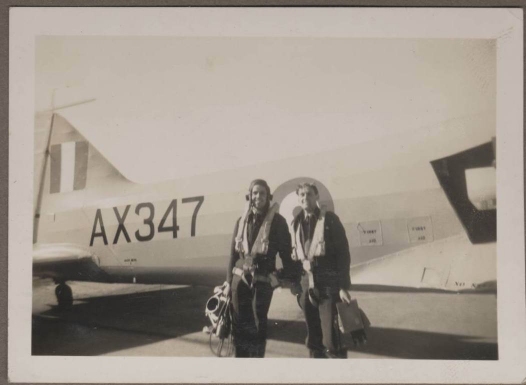 Theophilus
underwent part of his navigator training in Canada and he left
many photos taken of the places there that he visited and shots
taken from the Anson aircraft that he flew in.
Theophilus
underwent part of his navigator training in Canada and he left
many photos taken of the places there that he visited and shots
taken from the Anson aircraft that he flew in.
This photo of Theophilus with a colleague in front of an Anson indicates he completed his training at No.1 Air Observer School Anson AX347 at Malton, Ontario. This particular aircraft was lost in November 1943 when it crashed with that unit.

A class photo of 13 men with two officers, with Theophilus in
the middle row, second from right. It is assumed that this was
taken at 1 Air Observer School and is dated June 10th,
1943. The annotation the bottom, 68, correlates with the
unit diary, as it recorded that Course 68 Navigators had
graduated on the 11th of June 1943.
By late 1943, he was posted to Nassau in the Bahamas, presumably
to join 111 Operational Training Unit there, the RAF unit which
produced trained crews for the Liberator patrol aircraft.

A change of scenery from Snowy Canada, this photo was taken
during his time in Nassau.
His remains were never recovered and thus his name is entered
on the Runnymede Memorial in Surrey.
The Surrey Mirror and County Post on Friday, July 12th, 1946
carried a memorium notice:
PYE - In Loving Memory of our dear Son,
Theophilus Pye, R.A.F., killed on air operations July 13th,
1944.
"A loss so great, a shock severe,
To part with one we love so dear;
Though great the loss, we ll not complain,
But trust in Christ to meet again."
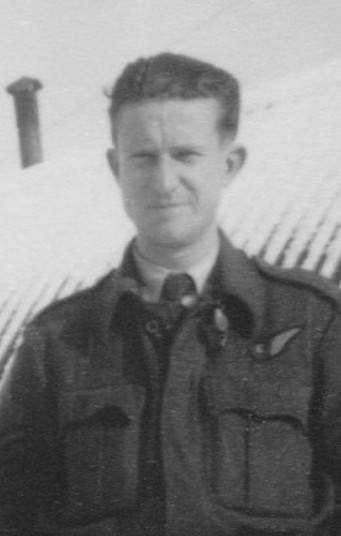 Sgt
Clifford Washington STEVENSON 1810168 (Flight
Engineer)
Sgt
Clifford Washington STEVENSON 1810168 (Flight
Engineer)
In 1919, Clifford was born in Sandwich in Kent, to
parents, Emma and George, who then moved to Buenos Aires,
Argentina. He was the middle of 3 brothers, Gordon the elder and
Bruce the younger. All 3 boys were schooled in England. Clifford
at St Johns on the Hill, Chepstow and then Dean Close School
Cheltenham. Once through school, Clifford had various jobs in
Buenos Aires, eventually working at a branch of the Royal Bank
of Canada.
His parents Emma and George Washington Stevenson were resident in Brazil when they married and they lived in Argentina during the 1930's. Clifford and his brothers can be found on shipping manifests between Argentina and England. When his father passed away in 1939, Clifford is described as a bank official in the UK National Probate Calendar published in 1949.
He joined the RAF as a volunteer on 1st October 1942, but
having had rheumatic fever he
could not be considered for aircrew, but still wanted to fly, so
trained as a flight engineer.
Once qualified he joined 120 squadron and flew Consolidated
Liberators.
He was classed as officially Wounded in Action as a result of
the crash of BZ910. While all the survivors were reported
wounded, Clifford is mentioned as being severely wounded in the
Squadron Operations Record Book and was the only survivor listed
as Wounded in the official RAF Casualty telegrams to the press.
When his father passed away in 1949, Clifford is described as a
bank official in the UK National Probate Calendar published in
1949.
His son Ian provided the following biographical details of his
father. He spent some time convalescing in Scotland,
before returning to RAF service. He continued to
serve in Coastal Command then Transport Command at the end of
the war, eventually leaving on 9th March 1947, as Warrant
Officer Flight Engineer, with 1939/45 Star and Atlantic Star war
medals. he was also a member of the Goldfish Club. The
photo provided of him shows him in Iceland in 1944.
He went back to Portrush to meet a Wren who he had been going out with during the war, but they both decided that they didn't hit it off in ‘civy street’. Whilst at the hotel on his own he met Edith Muriel Maybury, from Dublin. They hit it off and corresponded and met and married at Christ Church Leeson Park, Dublin on 9th September 1950.
When first married they lived in Higham’s Park in Essex, later moving to the family home in Furzedown, Tooing, South West London. Clifford continued to work as a Bank official at Royal Bank of Canada, 6 Lothbury in London till his retirement in 1979.
They have two children, Rosemary and Ian. They continued to have family holiday’s in Ireland with the families of Muriel’s two brothers.
Clifford died in Derriford Hospital on 17th April 2007
whilst on a visit to Rosemary and Ian who live in Cornwall.
After his death Muriel came to live in the same village as
Rosemary, so as to be near her grandchildren. She died on 15th
June 2018 and is buried with Clifford in the churchyard of St
Lalluwy, Menheniot, nr Liskeard Cornwall.
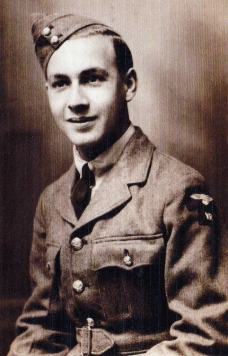 F/Sgt John Arthur
Blair 1105608 (Wireless Operator/Air Gunner (WO/AG)). Killed
in Action as a result of the crash of BZ910.
F/Sgt John Arthur
Blair 1105608 (Wireless Operator/Air Gunner (WO/AG)). Killed
in Action as a result of the crash of BZ910.
John was the son of Annie and John Blair of West Derby. His
father passed away the same year John was born. His mother
remarried but sadly again in 1927 she was widowed. She remarried
in 1943 and it was John's stepfather Stanley Boisson that is
named as his next of kin along with his mother by the
Commonwealth War Graves Commission.
John was one of those posted as missing after the crash but his
body was found washed up on the west coast of Scotland on the
13th of August 1944 and he is buried in the isolated cemetery at
Roshven. His brothers and sisters fondly remember him.
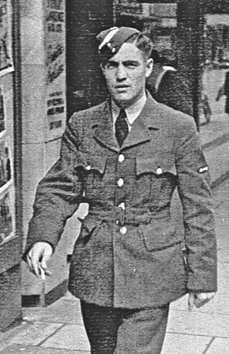
F/Sgt James Kenneth Logan RNZAF NZ417218 (WO/AG)F/Sgt James
Kenneth LOGAN NZ417218 was a member of the Royal New
Zealand Air Force. He was born in February 1917 in Riwaka. He
was sent to Canada for training in 1942. He was injured in the
crash and along with other crew members sent to the one of the
American Army hospitals established in Northern Ireland. After
the war he returned to his native New Zealand but sadly passed
away aged XXXX
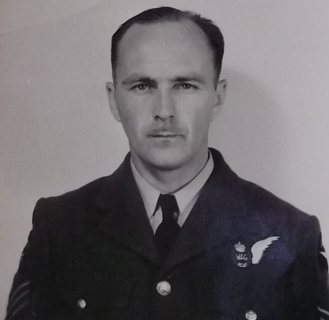
P/O Charles Edward Towsley J/93960 RCAF (WO/AG). Missing in
Action as a result of the crash of BZ910.
Charles hailed came from Winnipeg and was son of Elizabeth and
Miron Towsley. He was born on 1st July 1914, in Winnipeg,
Manitoba. At the time of enlistment he was living with his
parents Elizabeth and Miron Henry Towsley, at 174 Aberdeen
Avenue, Winnipeg, Manitoba.
He was educated at Machray (1922 to 1930), Winnipeg; and St
Johns (1930 to 1932), Winnipeg; where he gained General
Commercial Grade XI.
From 1935 to 1940 he was employed at Cummings Boat Workshop on
Boat Work. Because of the seasonal nature of the work he found
employment as a Warehouseman at H.L. MacKinnon from 1940 until
he enlisted.
His special qualifications and hobbies were Boat Mechanics and
Prospecting. He also enjoyed the sports of canoeing and
fishing.
Charles enlisted in the Royal Canadian Air Force on 25 July 1942
at Winnipeg Manitoba, having completed the Attestation Form on
22 June 1942, and was posted to No. 2 Manning Depot at Brandon
as Aircrew.
Following the completion of his training, he was posted to the
UK and to 59 Squadron at the end of November 1943. His
first operational mission appears to have been on the 6th of
February 1944. After four months there, he was then posted
to 120 Squadron.
He was not married and had no children.
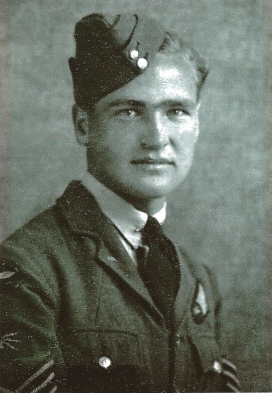
F/Sgt George Leslie Hendy 1575570 (Wireless Operator
Mechanic/Air Gunner). George Hendy at 92 years of age in
2014 is thought to be the last survivor of BZ910. He had often
told his family of his wartime exploits including the crash in
the sea during which he broke a leg.
He was born to Mary Ellen and Percy James hendy on
George, upon recovering from his injuries, stayed on in the RAF
until 1970, married and raised a family of three. In 1958,
he is found in the Leicester Mercury newspaper, photographed
while undertaking a training course in America on the Thor
guided missile. His parents, Mr and Mrs James Hendy were
listed as living at 4 Elmtree Road, Cosby at that time. By
December 1966, he was serving in Aden with 78 Squadron RAF as
Master Air Electronics Operator.
